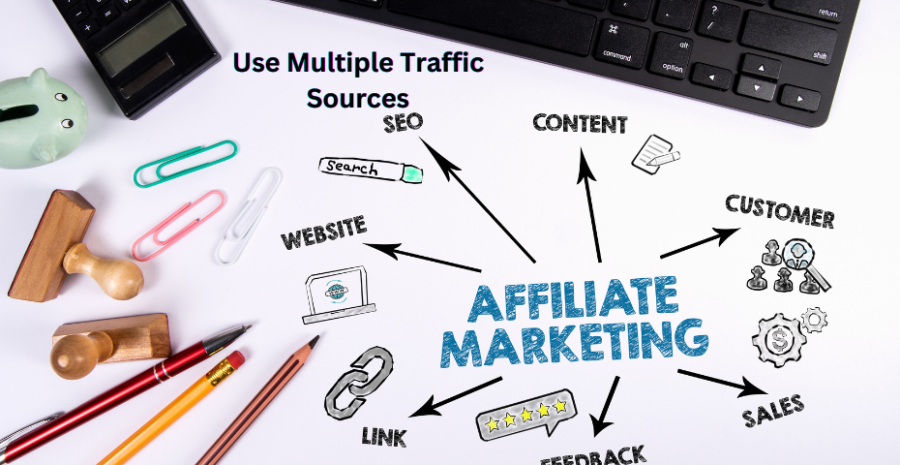

In the fast-paced world of online business, entrepreneurs are constantly seeking innovative ways to generate revenue and expand their reach. Affiliate marketing has emerged as a powerful tool for entrepreneurs, offering a mutually beneficial opportunity where both the product creator and the marketer profit.
However, simply placing affiliate links across various platforms isn't enough to achieve success. It requires a strategic approach, understanding of the market, and a deep connection with your audience.
As an entrepreneur, mastering the art of advertising affiliate products can significantly impact your business growth and profitability.
Affiliate marketing offers immense potential, but it also comes with challenges. The digital landscape is crowded, with countless entrepreneurs vying for attention. To stand out, you need to adopt a holistic approach that combines content creation, audience engagement, and analytical insights.
Each of the following tips has been carefully crafted to address the various aspects of affiliate marketing, from understanding your niche to building trust with your audience. Whether you're a seasoned entrepreneur or just starting out, these strategies will provide the foundation you need to succeed in promoting affiliate products.
By implementing these tips, you'll not only enhance your marketing efforts but also create lasting relationships with your audience, leading to sustainable business growth.
This guide will explore 13 essential tips that will help you advertise affiliate products the right way, ensuring that you not only reach your target audience but also convert them into loyal customers.

Understanding your niche is the cornerstone of any successful affiliate marketing strategy. Before promoting any products, take the time to thoroughly research and identify the specific interests, needs, and pain points of your target audience.
Knowing your niche allows you to tailor your marketing efforts to meet the unique demands of your audience, making your promotions more relevant and engaging. It also helps you choose affiliate products that align with your audience's preferences, increasing the likelihood of conversions.
Dive deep into forums, social media groups, and online communities where your audience hangs out to gain insights into their behavior and preferences.
By understanding your niche, you'll be better equipped to create content that resonates with your audience, positioning yourself as an authority in your field.

Selecting the right affiliate products is crucial to the success of your marketing efforts. It's essential to choose products that are not only relevant to your niche but also offer value to your audience. Avoid promoting products solely based on high commission rates; instead, focus on products that solve real problems for your audience.
Research the product thoroughly, read customer reviews, and even try the product yourself if possible. This will give you a better understanding of its features, benefits, and potential drawbacks, enabling you to provide honest and informed recommendations.
When you choose the right products, your audience is more likely to trust your recommendations, leading to higher conversion rates and long-term success in affiliate marketing.
.png)
Content is king in the world of affiliate marketing. To effectively promote your affiliate products, you need to create high-quality content that provides value to your audience. This could be in the form of blog posts, videos, podcasts, or social media posts.
Focus on creating content that educates, entertains, or solves a problem for your audience. Your content should be engaging, informative, and well-researched, reflecting your expertise in the niche. Additionally, ensure that your content is optimized for search engines by using relevant keywords, meta descriptions, and high-quality images.
High-quality content not only attracts more traffic to your site but also builds trust with your audience, making them more likely to purchase through your affiliate links.

Trust is the foundation of any successful affiliate marketing strategy. Your audience needs to trust that you have their best interests at heart before they’ll consider purchasing through your affiliate links. Building trust takes time and requires consistent effort.
Be transparent about your affiliate relationships and disclose when you’re promoting affiliate products. This honesty will be appreciated by your audience and will strengthen your credibility. Additionally, focus on providing value through your content rather than just pushing products.
Engage with your audience by responding to comments, answering questions, and being present on social media. The more you build genuine relationships with your audience, the more likely they are to trust your recommendations and support your affiliate marketing efforts.

Your website plays a crucial role in your affiliate marketing strategy. To maximize conversions, your site needs to be user-friendly, fast, and optimized for both desktop and mobile users. Ensure that your affiliate links are prominently placed within your content without being overly intrusive.
Use clear calls to action (CTAs) that guide your visitors toward making a purchase. Additionally, consider implementing landing pages for your affiliate products that highlight their key features and benefits. A well-optimized website not only improves the user experience but also increases the likelihood of converting visitors into customers.
Regularly test different elements of your site, such as CTAs and link placements, to identify what works best for your audience.
.png)
Email marketing is a powerful tool for promoting affiliate products. Building an email list allows you to maintain direct communication with your audience and share valuable content, including your affiliate promotions. Segment your email list based on your subscribers’ interests and behaviors to send more targeted and relevant offers.
Create engaging email campaigns that provide value first and promote affiliate products subtly. Use compelling subject lines, personalized content, and clear CTAs to encourage clicks and conversions.
Additionally, consider setting up automated email sequences that nurture your leads and introduce affiliate products at the right time.
By leveraging email marketing effectively, you can drive consistent traffic to your affiliate links and boost your overall sales.

Social media platforms offer immense potential for promoting affiliate products, especially if your audience is active on these platforms. Choose the right social media channels based on where your target audience spends their time.
For example, Instagram and Pinterest are great for visual products, while Markethive, Twitter and LinkedIn work well for B2B products. Create a consistent posting schedule and share a mix of content, including product promotions, educational posts, and engaging visuals.
Use hashtags, stories, and live streams to increase your visibility and reach a broader audience. Additionally, engage with your followers by responding to comments, joining discussions, and sharing user-generated content.
Social media allows you to build a community around your brand and promote affiliate products in a more organic and authentic way.

Search engine optimization (SEO) is critical for driving organic traffic to your affiliate content. Focus on optimizing your website and content for relevant keywords that your audience is searching for. This includes using keywords in your titles, headers, meta descriptions, and throughout your content.
Additionally, create high-quality backlinks to your site by guest posting on reputable blogs, collaborating with influencers, and participating in online forums. The more authoritative your site appears to search engines, the higher it will rank in search results.
Regularly update your content to ensure it remains relevant and optimized for search engines. By focusing on SEO, you can attract more organic traffic to your affiliate links, leading to increased conversions and revenue.

Continuous analysis and optimization are key to the success of your affiliate marketing campaigns. Use analytics tools like Google Analytics, affiliate dashboards, and heat maps to monitor the performance of your campaigns.
Track key metrics such as click-through rates (CTR), conversion rates, and return on investment (ROI) to identify what’s working and what’s not. Use A/B testing to experiment with different content formats, headlines, CTAs, and link placements.
Analyze the data to understand your audience’s behavior and preferences, and make adjustments to improve your results. By regularly analyzing and optimizing your campaigns, you can maximize your affiliate marketing efforts and achieve better outcomes.

Honesty is critical in affiliate marketing. Your audience relies on your expertise and recommendations, so it’s important to provide honest reviews of the products you promote. Avoid exaggerating the benefits of a product or hiding its flaws, as this can damage your credibility and trustworthiness.
Instead, focus on providing balanced and well-researched reviews that highlight both the pros and cons of a product. If a product isn’t right for your audience, don’t be afraid to say so.
Your honesty will be appreciated by your audience and will build long-term trust, leading to higher conversion rates and repeat customers.

Relying on a single traffic source can be risky, as changes in algorithms or policies can drastically impact your affiliate marketing efforts. Diversify your traffic sources to reduce your dependency on any one platform.
In addition to organic search traffic, explore paid advertising, social media, email marketing, and content syndication as potential traffic sources. Each source has its own strengths and can help you reach different segments of your audience.
By diversifying your traffic sources, you can create a more stable and sustainable affiliate marketing strategy, ensuring consistent traffic and revenue.

Engagement is key to building a loyal audience and promoting affiliate products effectively. Encourage your audience to interact with your content by asking questions, responding to comments, and creating interactive content like polls and quizzes.
Use social media and email marketing to start conversations and build relationships with your audience. The more engaged your audience is, the more likely they are to trust your recommendations and purchase through your affiliate links.
Additionally, actively participate in online communities and forums related to your niche. By being present and engaged, you can establish yourself as an authority in your field and build a community of loyal followers.
.png)
The digital marketing landscape is constantly evolving, with new trends, tools, and strategies emerging regularly. To stay competitive in affiliate marketing, it’s important to stay updated with industry trends and adapt your strategies accordingly.
Follow industry blogs, attend webinars, and join online communities to stay informed about the latest developments. Experiment with new platforms, content formats, and marketing techniques to see what works best for your audience.
By staying ahead of the curve, you can keep your affiliate marketing efforts fresh and effective, ensuring long-term success.
Affiliate marketing offers a lucrative opportunity for entrepreneurs to generate income and build their businesses. However, success in affiliate marketing requires more than just placing links and hoping for the best.
It involves a strategic approach that combines understanding your audience, choosing the right products, creating valuable content, and continuously optimizing your efforts.
By following the 13 tips outlined in this guide, you can create a robust affiliate marketing strategy that drives traffic, builds trust, and converts leads into customers. Remember that success in affiliate marketing doesn’t happen overnight; it requires patience, persistence, and a commitment to providing value to your audience.
As you implement these strategies, you’ll be well on your way to mastering affiliate marketing and achieving your business goals.
(19).png)
About: Andries vanTonder (65)
45 years selfemployed
He is a Serial Entrepreneur, an Enthusiastic supporter of Blockchain Technology and a Cryptocurrency Investor
Find me: Markethive Profile Page | My Twitter Account | My Instagram Acount | and my Facebook Profile.
